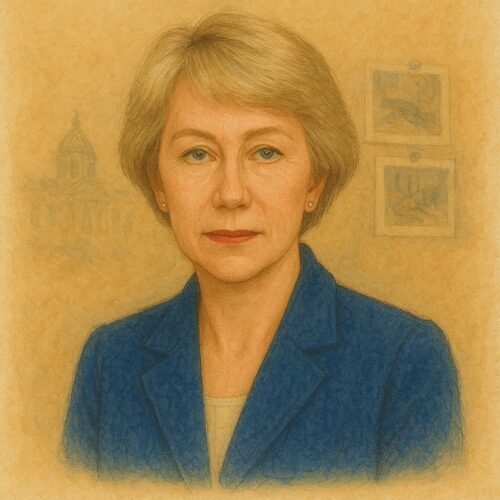Helen Mirren: Defining Strength and Complexity in Prime Suspect
Early Life & Training
Helen Mirren, born Helen Lydia Mironoff on July 26, 1945, in London, carries an intriguing mix of Russian aristocratic and English working-class heritage. Growing up in Leigh-on-Sea, Essex, Mirren nurtured a profound interest in performance early in life. She honed her craft with the National Youth Theatre and swiftly graduated to the Royal Shakespeare Company (RSC), where she immersed herself in classical theatre, gaining critical acclaim for roles in works by Shakespeare and other literary giants. This classical training equipped Mirren with unparalleled discipline, technical proficiency, and an extraordinary emotional depth that would later characterize her best-known performances.
Breakthrough & Defining Role: Prime Suspect
In 1991, Helen Mirren made television history with her gritty and unflinching portrayal of Detective Chief Inspector Jane Tennison in ITV’s groundbreaking series Prime Suspect, created by writer Lynda La Plante. At a time when female detectives on television were predominantly supporting characters, Tennison emerged as a fully-realized protagonist, unapologetically ambitious and fiercely determined in a deeply male-dominated environment.
Mirren infused Tennison with complexity rarely seen before, portraying her as brilliant yet deeply flawed, simultaneously authoritative and vulnerable. Her struggles with institutional sexism, personal demons, and ethical dilemmas resonated profoundly with audiences. Across seven seasons (1991–2006), Mirren transformed Tennison from a tough, driven detective to a nuanced and layered figure whose professional accomplishments were matched by equally compelling personal struggles. This pivotal role not only solidified Mirren’s reputation but fundamentally reshaped perceptions of women on screen, inspiring subsequent generations of writers and performers.
Acting Style & Range
Mirren’s acting style in Prime Suspect exemplifies her broader approach: disciplined yet raw, intellectual yet deeply emotional. Her performance goes beyond mere dialogue, utilizing subtle physical cues—careful glances, guarded posture, weary gestures—to reveal Tennison’s inner turmoil and steely resolve. Mirren masterfully balances vulnerability with authority, capturing the multi-dimensional nature of a woman leading in a male-centric sphere. Her capability to deliver powerful emotional moments, often without spoken dialogue, distinguished her as a master of her craft.
Notable Performances Beyond Prime Suspect
- The Queen (2006) – Mirren’s Oscar-winning turn as Queen Elizabeth II earned worldwide acclaim for her nuanced, empathetic portrayal, redefining her international stardom.
- Gosford Park (2001) – Her understated performance as Mrs. Wilson added compelling layers to Robert Altman’s classic ensemble drama.
- Calendar Girls (2003) – Demonstrating her comedic versatility, Mirren charmed audiences portraying real-life character Chris Harper in this inspiring, comedic-drama.
- Red (2010) – A notable departure, Mirren combined action and comedy effortlessly, broadening her appeal and highlighting her willingness to explore diverse genres.
- Catherine the Great (2019) – Returning to television, Mirren once again brought strength, complexity, and depth, embodying another formidable historical figure.
Awards & Accolades
Helen Mirren’s career boasts a remarkable range of awards and recognitions. She earned multiple BAFTAs and Emmy Awards specifically for her role in Prime Suspect, underscoring her impact on the television landscape. Additionally, her Academy Award win for The Queen, alongside Golden Globes and Olivier Awards, emphasizes her versatile talent and broad-ranging contributions to both film and stage. Her consistent ability to deliver performances of profound depth has made her one of the most celebrated and respected actors of her generation.
Collaborations & Industry Impact
The collaboration between Mirren and writer Lynda La Plante for Prime Suspect proved transformative for television drama. La Plante’s sharp, provocative writing paired with Mirren’s meticulous, insightful interpretation led to a powerful synergy, creating a seminal work that tackled previously underrepresented themes. The impact of their partnership extended beyond entertainment, reshaping societal discussions about women in professional authority roles and setting new standards for realism and narrative depth in crime drama.
Cultural Legacy
Mirren’s portrayal of Jane Tennison transcended entertainment, becoming an influential part of popular culture. Tennison represented a nuanced depiction of a professional woman navigating and ultimately challenging deeply entrenched sexism. Mirren’s portrayal paved the way for richer, more realistic portrayals of women in law enforcement, contributing significantly to shifts in cultural attitudes toward female professionals on screen. Even today, the influence of Mirren’s nuanced character work echoes through countless crime dramas worldwide.
Behind-the-Scenes Trivia
Mirren’s preparation for her role as Jane Tennison was notably thorough. She spent considerable time with actual detectives, closely observing their behaviors, procedures, and personal coping mechanisms. This attention to detail contributed significantly to the authenticity of her performance. Off-screen, Mirren maintains an active voice in various humanitarian and charitable efforts, often leveraging her high-profile status to advocate for gender equality, human rights, and conservation.
Final Word
Helen Mirren’s tenure as Jane Tennison in Prime Suspect remains a benchmark in television history. Her fearless embodiment of strength, vulnerability, intelligence, and ambition provided audiences with a deeply relatable and profoundly influential character. Mirren’s work not only elevated the art of television acting but also transformed societal perceptions of female leadership roles, cementing her legacy as one of Britain’s most impactful cultural figures.
Word count: 1,059
